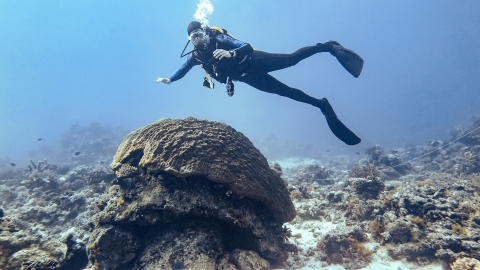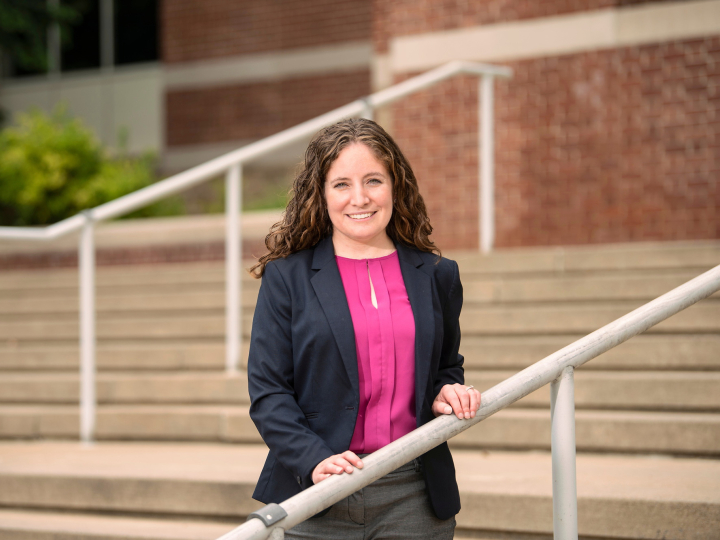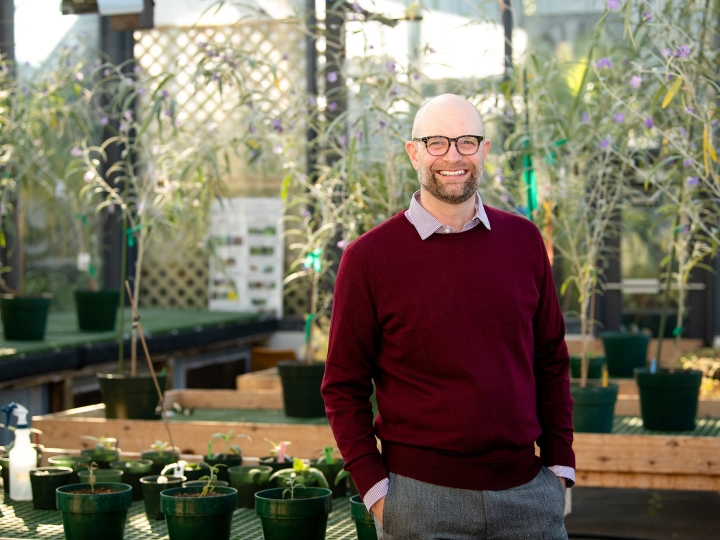
Bucknell Student’s Journey to Great Barrier Reef Yields Climate Breakthrough
September 26, 2019
Kyle Fouke '20 says opportunities to travel to geologically interesting places like Australia are exactly what attracted him to Bucknell in the first place. Mike Kingsford, James Cook University-Townsville
To accurately predict where the world's climate is headed, you'll need to dive into the research. So bring your wetsuit, scuba gear and an air-powered drill that works underwater.
That was the plan two summers ago when Kyle Fouke '20, a geology major from Urbana, Ill., joined a team of researchers from the University of Illinois at Urbana-Champaign on a 9,000-mile journey to the Great Barrier Reef in Australia. Their plan: dive down to the coral reef for science.
It turns out that coral skeletons, like tree rings, offer a window into the past. Scientists rely on these skeletons to study past climate patterns and make remarkably accurate predictions about the future of our planet.
This past summer, Fouke and his team studied their coral samples from Australia, and they discovered something that could affect global climate predictions.
"We established a correction factor based on microscopy and chemistry, allowing coral skeletons to be used as the gold standard for accurate climate predictions," he says.
In other words, they learned that the existing methods used to make climate predictions could result in measurements that are off by as much as 16 degrees Fahrenheit. They published their findings in the journal Frontiers in Marine Science.
Wherever the Science Takes Him
Opportunities to travel to geologically interesting places like Australia, Curaçao and Montana are exactly what attracted Fouke to Bucknell in the first place.
"I went to visit the geology department, and their big thing is going outside on field trips," Fouke says of his first visits to campus. "That really hooked me into it. I'm a big 'let's be outside in nature' type of guy."
Sure enough, through the encouragement and support of Fouke's professors at Bucknell, he applied for and received funding needed to take trips to all three places mentioned above. And that's how he ended up on the other side of the world, traveling nine hours on a boat to the world's largest coral reef.
"And then we're out there collecting corals," he says. "It was just a surreal experience."
Fouke and his team used a 1-meter-long drill bit to collect six samples of Porites coral. They brought the samples, extracted with permission from the Australian Research Council, back to the United States.
Looking Closer Than Ever
Back in the lab, the team cut the coral into thin slices — each three times thinner than a human hair. They examined these thin sections with cutting-edge microscopes that used both plain and polarized light. As a result, they could look closer at coral than anyone had before.
That level of detail enabled Fouke to realize that physical, chemical and biological processes called diagenesis were altering the skeletal chemistry of the coral. In diagenesis, seawater enters the porous coral and deposits minerals that can look a lot like the original coral. If you're not looking closely enough or with the right tools, it's easy to overlook diagenesis. That could skew your temperature readings.
"Future calculations can be made to account for this diagenesis, allowing future predictions to be more accurate," he says.
With this new knowledge in hand, it was time for Fouke's team to tell the world about their findings. Fouke says scientific writing is an essential skill to develop — one that's important when choosing a college.
While at Bucknell, Fouke has worked with Professor Jeff Trop, geology, to sharpen his scientific and writing skills. Fouke says Bucknell professors aren't afraid to "hand off the reins" and work closely with students to prepare peer-reviewed manuscripts meant for publication.
"They know the science; they know the ropes; they know how to write," Fouke says. "They're excellent at advising the student in the classroom, the laboratory and the field."
For his senior honors thesis, Fouke is turning his attention to the coral reefs on Curaçao in the southern Caribbean. This continuing geoscience research experience will be invaluable for Fouke as he applies to graduate schools. His ultimate goal is to earn a Ph.D. and become a professor.

